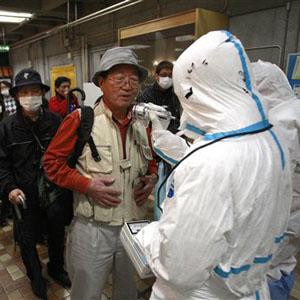
This is the VOA Special English Health Report.
The crisis at the damaged Fukushima Dai-Ichi Nuclear Power Station in northern Japan has raised worries about radiation risks. We spoke Tuesday with Jonathan Links, an expert in radiation health sciences. He is a professor at the Johns Hopkins Bloomberg School of Public Health in Maryland.
Professor Links says workers within the nuclear plant are the only people at risk of extremely high doses of radiation.
JONATHAN LINKS: "Of course, we don't know what doses they've received, but the only persons at risk of acute radiation effects are the workers."
For other people, he says, there may be a long-term worry. People can get cancer from low doses of ionizing radiation, the kind released in a nuclear accident.
Professor Links says scientists can use computers to quickly model where radioactive material has blown and settled. Then they measure how large an area is contaminated. He says if the situation is serious enough, officials could take steps like telling people not to eat locally grown food or drink the water.
JONATHAN LINKS: "But that would only be the case if there was a significant release and, because of wind direction, the radioactive material was blown over the area, and then settled out of the air into and onto water, plants, fruits and vegetables."
The reactors at Fukushima are on the Pacific coast. But Professor Links says people should not worry about any radioactive material leaking into the ocean.
JONATHAN LINKS: "Even in a worst-case scenario accident, the sea provides a very high degree of dilution. So the concentration of radioactivity in the seawater would still be quite low."
Japan is the only country to have had atomic bombs dropped on it. That memory from World War Two would create a stronger "psychological sensitivity" to radiation exposure, Professors Links says.
Next month is the 25th anniversary of the explosion and fire that destroyed a reactor at Chernobyl in Ukraine. The 1986 event was the world's worst accident in the nuclear power industry.
A new United Nations report says more than 6,000 cases of thyroid cancer have been found. These are in people who were children in affected areas of Belarus, Russia and Ukraine. The report says that by 2005 the cancers had resulted in 15 deaths.
The cancers were largely caused by drinking contaminated milk. The milk came from cows that ate grass where radioactive material had fallen.
And that's the VOA Special English Health Report, written by Caty Weaver. To get the latest updates, go to voaspecialenglish.com. I'm Steve Ember.
ionizing radiation: 电离辐射
thyroid: a small organ at the front of the neck that produces hormones that control the way in which the body grows and functions 甲状腺
Foreigners, wary of risk, flee Tokyo
(来源:VOA 编辑:崔旭燕)
